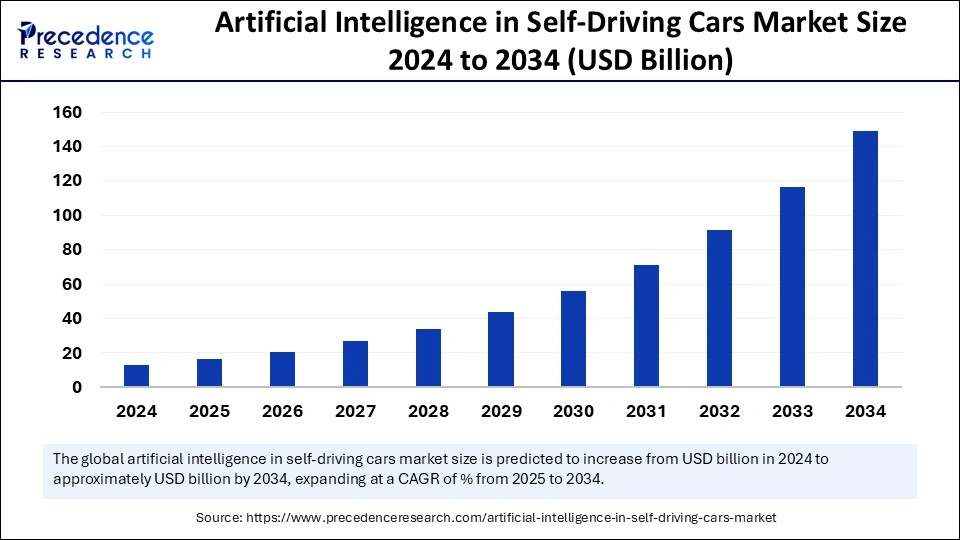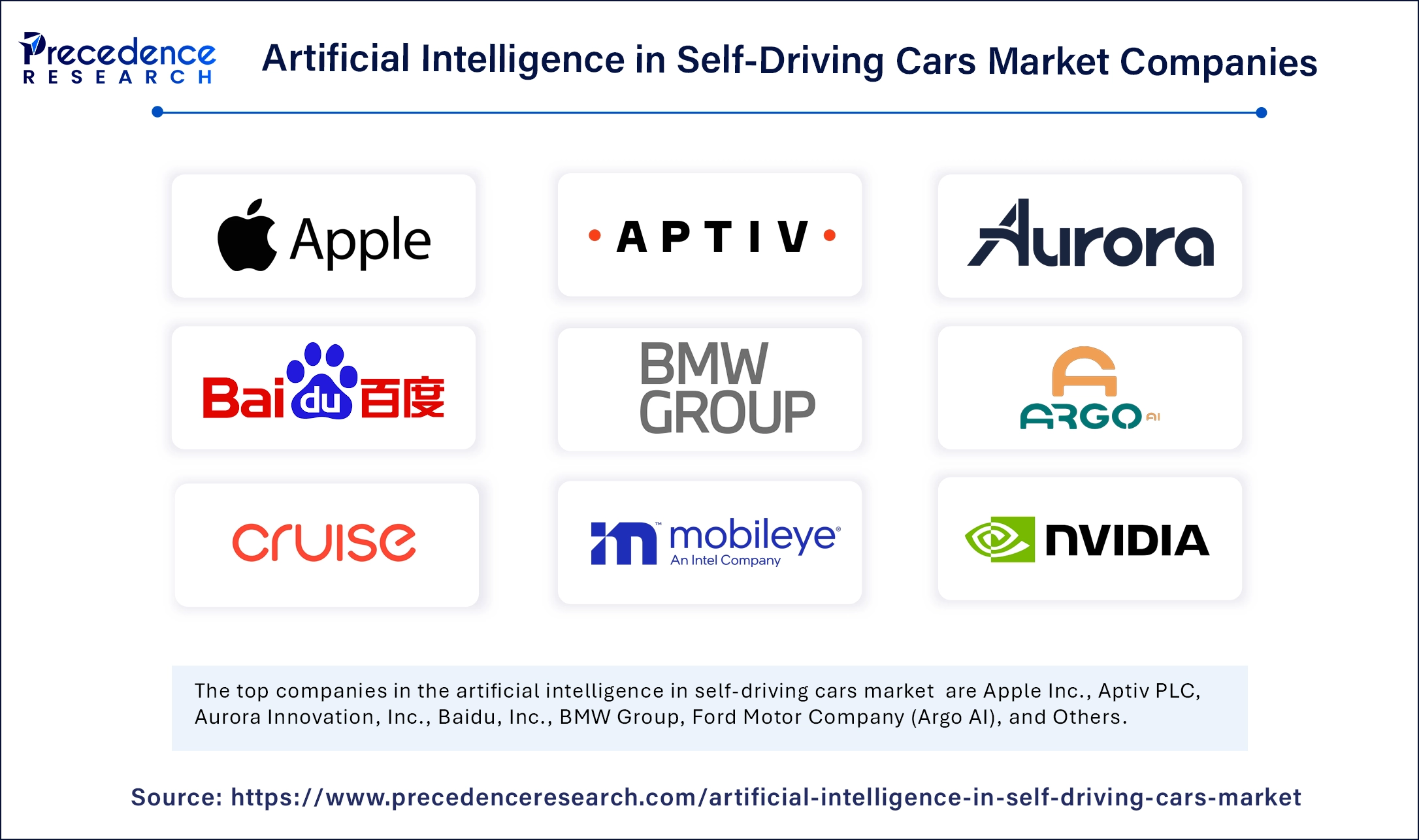August 2024
The AI in self-driving cars market is set to grow significantly by 2034, fueled by tech advancements and rising demand for autonomous transportation. The market sizing and forecasts are revenue-based (USD Million/Billion), with 2024 as the base year.
AI for self-driving cars boosts safety and autonomy via machine learning, sensor fusion, and real-time decision-making for smarter mobility solutions. The market is growing due to the rising demand for safety features in vehicles, increasing production of autonomous vehicles, and ongoing technological advancements.

In the self-driving car realm, artificial intelligence is quickly changing the way autonomous cars are able to learn and drive. By 2025, AI is expected to enable cars to accurately understand traffic situations and make driving decisions on the fly. Considering 94% of accidents on the road are due to human errors, AI-powered systems can quickly mitigate the risks of human errors by not only losing attention but also by reacting faster and communicating with other vehicles via vehicle-to-everything (V2X) communication. Some of the key innovations behind the self-driving automobile movement are happening with Waymo, which has developed a fully autonomous ride-hailing service and is now completing over 200,000 paid rides per week in cities like San Francisco and Los Angeles.
In Britain, start-up Wayve, with support from Microsoft and Nvidia, is working with Nissan to bring self-driving technology to the market by 2027. Meanwhile, DeepRoute.ai, a Chinese firm, is working with Qualcomm to develop affordable intelligent driver assistance systems. These technologies focus on enhancing safety, modifying driving routes, reducing traffic congestion, and enhancing the driving experience.
Artificial intelligence (AI) in self-driving cars refers to sophisticated technologies like machine learning, computer vision, natural language processing, and fusion sensors that allow vehicles to perceive their environment, act, and drive with minimal or no human assistance. AI is the "brain" of self-driving cars, receiving and processing large amounts of real-time data from cameras, radar, LiDAR, and GPS sensors to drive safely and effectively. The artificial intelligence in self-driving cars market is gaining considerable momentum as mobility manufacturers and technology companies are investing in self-driving systems. The market growth can be further attributed to improvements in sensor technologies, the increasing need for safer transportation options, and government support to create smart mobility systems.
Technological advancements have significantly improved how accurately autonomous systems perceive, make decisions, and adapt in real time. Furthermore, the need to reduce accidents caused by human error and improve efficient transportation has led to increased interest and investment in the area. AI allows vehicles to sense objects, forecast the actions of pedestrians and other vehicles, and make decisions based on the context at velocities that exceed human ability.
| Report Coverage | Details |
| Dominated Region | North America |
| Fastest Growing Market | Asia Pacific |
| Base Year | 2024 |
| Forecast Period | 2025 to 2034 |
| Segments Covered | Vehicle Type, Application, and Regions |
| Regions Covered | North America, Europe, Asia-Pacific, Latin America and Middle East & Africa |
Consumer Demand for Safety Features
In 2024, worldwide car sales hit 74.6 million units, up 2.5% from 2023, showcasing ongoing consumer confidence in the automotive industry. This sales growth is primarily driven by demand for better safety, comfort, and technology. Consumers anticipate that new vehicles will include safety and convenience features such as adaptive cruise control, collision mitigation, and lane departure warning or lane-keeping assistance as standard equipment. The automotive industry is beginning to implement AI systems to facilitate autonomous driving decisions.
In addition to safety, AI is evolving in the context of autonomous vehicles to facilitate crime detection and public safety. These cars are equipped with facial recognition, license plate scanning, and behavioral analysis capabilities to enhance public safety. AI-powered autonomous vehicles can navigate surroundings to monitor and identify suspicious activity and alert police or security in real time. In addition, the automotive industry in the U.S. is exploring whether AI surveillance systems’ functionalities can be associated with identifying patterns of potential theft or vandalism to create a more generic and potentially broader application of AI beyond traffic safety as it relates to autonomous vehicles.
Cyberattacks and Data Privacy Risks Pose Challenges
Cyberattacks and data privacy risks pose challenges in the artificial intelligence in self-driving cars market. Concerns about data privacy and cyberattacks inhibit the acceptance and use of AI systems in self-driving vehicles. Self-driving cars collect personal data, like location information, biometric data, and driving behavior, raising concerns about unauthorized access or malicious behavior. If attackers exploit these weaknesses, they could turn off braking systems, take over acceleration, or even take control of steering, posing serious safety risks. In June 2024, for example, researchers exploited vulnerabilities of Kia's portal on the web and gained remote access to vehicle features utilizing only a license plate.
The U.S. government proposed a ban on imports of cars and other vehicles and components manufactured in China and Russia because of concerns about espionage based on vehicle systems and connectivity. Such incidents demonstrate the need to create and enforce more robust cybersecurity measures and standards for data governance to earn and maintain public trust and comply with regulations.
Expansion of Mobility-as-a-service (MaaS) Platforms
The proliferation of Mobility-as-a-Service (MaaS) platforms, including autonomous ride-hailing and robotaxis, offers tremendous potential for artificial intelligence in self-driving car market. These services utilize complex AI systems to support their deployment in real-time, route optimization, predictive maintenance, and fleet management. By integrating electric vehicles (EVs), MaaS providers contribute to cleaner and greener forms of transportation that align with global sustainability goals. AI also enhances operational efficiencies, such as smart energy management and more precise route planning. Moreover, advanced vehicle-to-infrastructure (V2I) communication technologies, like LISNR's ultrasonic proximity systems, provide a foundation for ongoing fleet deployment and charging coordination.
The passenger vehicles segment dominated the artificial intelligence in self-driving cars market in 2024. This is mainly due to the increased production of passenger vehicles worldwide. There are many automotive manufacturing companies, such as Tesla, BMW, and Audi, that already integrated AI-based driver assistance technologies into their passenger vehicles as a way to improve safety, comfort, and overall efficiency. The rise in the demand for luxury vehicles with ADAS further bolstered the segment. With the growing concerns about road accidents and a strong emphasis on enhancing passenger safety, the integration of AI-driven systems is increasing in passenger vehicles, sustaining the segment’s position in the market.
The commercial vehicles segment is expected to expand at a significant CAGR over the projection period. Logistics and delivery companies are seeking solutions to automate and drastically improve productivity. Thus, operationally it is becoming common practice to use automation and apply AI in trucks and delivery vans. Fleet operators are increasingly integrating AI in commercial vehicles to enhance safety and efficiency and reduce driver fatigue. Waymo and TuSimple are focusing on testing autonomous heavy-duty trucks and other commercial vehicles.
The driver assistance systems segment captured the largest share of the artificial intelligence in self-driving cars market in 2024. This is mainly due to stringent government regulations to improve vehicle safety. Driver assistance systems such as adaptive cruise control, lane keeping assist, automatic emergency braking, and parking assist are increasingly being integrated into autonomous vehicles. OEMs are working to incorporate AI-based sensors, cameras, and machine learning, delivering real-time decision-making. ADAS is considered a significant link to transitioning from a manual driving experience to a fully autonomous experience. ADAS is a key pursuit for automotive manufacturers and AI technology solution providers.
On the other hand, the autonomous navigation segment is expected to expand at the fastest rate during the forecast period. The growth of the segment can be attributed to advances in deep learning algorithms, computer vision, and sensor fusion technologies. This application category is focused on delivering vehicles that will operate without human intervention. There has been an increase in demand for vehicle safety, in which autonomous navigation plays a key role. Autonomous navigation systems enhance vehicle safety by reducing human errors and improving efficiency through optimized traffic management.
North America registered dominance in the artificial intelligence in self-driving cars market in 2024 and is expected to sustain its position in the market during the forecast period. This is mainly due to its robust technological infrastructure, providing a foundation for autonomous driving technology. The region is an early adopter of self-driving solutions. There is a strong emphasis on an innovation-based ecosystem, leading to the development of an advanced ecosystem for testing and deploying AI in real-world autonomous conditions. AI technology is already in use in the North American automotive industry for real-time decision-making and predictive analytics. The region also benefits from an increasing partnership between automotive companies and AI startups, such as the collaboration between Waymo and Uber Freight on using AI in logistics.
The U.S. remains the leader in North America thanks to its widespread network of AV testing zones, such as areas in Arizona, California, and Michigan. As of the end of 2024, California has more than 50 companies holding permits to test autonomous vehicles (AVs). Companies like Tesla, Cruise, and Waymo continue to push the technological advances with their approaches to AI, with Cruise was recently given the green light to expand autonomous taxi operations to non-California states. Also, President Biden's 2024 Infrastructure Plan allocated USD 4 billion for smart city projects as well as intelligent transportation systems and to promote AI for urban mobility.
Asia Pacific is anticipated to witness the fastest growth during the forecast period. This is mainly due to the rising integration of AI technologies into self-driving vehicles. With rapid urbanization, the demand for smart mobility is rising in the region. Countries in APAC are capitalizing on AI technology to better manage traffic congestion and safety. In late 2024, China began adopting predefined conditions for self-driving vehicle testing in 5G-V2X enabled zones, enhancing data transfer between vehicles and systems in real time. Similarly, countries such as Japan and South Korea announced national strategies for public transport to begin delegating driving tasks to AI by 2030. Automakers in the region are also partnering with AI firms to accelerate the commercialization of self-driving cars. In addition, the rapid expansion of the automotive industry and rising production of vehicles contribute to market growth.
Europe is observed to grow at a considerable growth rate in the upcoming period. The growth of the artificial intelligence in self-driving cars market in Europe can be attributed to stringent regulations regarding vehicle safety. European cities, such as Hamburg and Paris, are implementing AI-driven traffic management systems as part of their smart mobility strategies. Countries such as Germany, the UK, France, and Sweden are at the forefront of using AI to improve vehicle-to-everything (V2X) communication and cooperative automated driving.

By Vehicle Type
By Application
By Region
For inquiries regarding discounts, bulk purchases, or customization requests, please contact us at sales@precedenceresearch.com
No cookie-cutter, only authentic analysis – take the 1st step to become a Precedence Research client
August 2024
March 2025
November 2024
November 2024